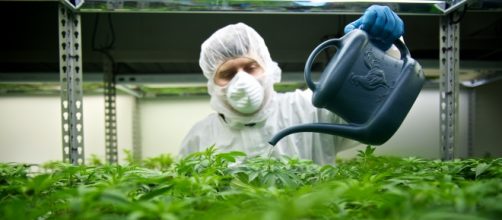Pain sufferers can wean themselves off heavy pain relievers, alcohol and other drugs as they increase their use of medical cannabis, according to Canadian researchers.
Canada is leading the world in medical cannabis studies and a new survey, published in the academic journal – Drug and Alcohol Review – showed: of 473 adult therapeutic cannabis users, 87 percent gave up prescription medications, alcohol, or other drugs in favor of cannabis. Adults younger than 40 were likely to give up all three for medical cannabis.
That may not be a large sample size but lead researcher Philippe Lucas said a larger, multi-site study is being launched shortly by his employer Tilray, a government licensed marijuana producer with a 60,000 square foot/30 million dollar testing facility, located in Nanaimo, British Columbia.
Large pharmaceutical companies won’t comment.
One pharmaceutical spokesman told this reporter, “We don’t have a position on medicines which are aren’t approved by FDA, so unfortunately we won’t be able to offer comment.”Andrew Powaleny, senior manager of communications at PhRMA, toted that line for the Pharmaceutical Research and Manufacturers of America, which represents leading research-based pharmaceutical companies in the U.S.
Lucas calls study findings “the substitution effect,” when someone substitutes marijuana for alcohol, pharmaceuticals or illegal drugs. “The other encouraging news,” said Lucas, “was 80% reporting substitution for prescription drugs, 52% for alcohol, and 32% for illicit substances.”
The U.S.
Veterans Affairs agency does not condone marijuana use. In fact, if a Veteran’s urine test shows positive, he or she can lose benefits, but the Canadian V.A. pays for 100% of a military or police officer’s cannabis. The Canadians are especially interested in cannabis’ positive effects on post-traumatic stress disorder (PTSD).
According to U.S. Army Veteran and Grow for Vets Executive Director, Roger Martin, many of these American heroes die from the deadly prescription drugs being handed out like candy by V.A. doctors. "Others often in a drug-induced stupor, simply give up all hope and take their own lives," he said. "The bravest among us deserve better. They deserve a safe alternative to these dangerous drugs.”
The Tilray facility is also funding a $400,000 clinical trial examining the effects of medical cannabis on PTSD.
Different levels of THC and CBDs (tetrahydrocannabinol and cannabinoids) will be used to test theories that it can improve patient sleep, hope and quality of life, as well as reducing the use of alcohol, and illicit or pharmaceutical drugs. Because the Tilray facility grows cannabis, it will provide cannabis to patients in the studies.
In a recent patient survey that garnered 301 responses, 12% of Tiray’s patients reported a decrease in cigarette and tobacco use, 25% in alcohol use, 5% in illicit drug use, and 63% reported a drop in prescription drugs, which Lucas called “encouraging.” The primary prescription drugs replaced by cannabis were opiates, anxiety pills, or antidepressants.
Cesamet is used in Canada to treat severe nausea and vomiting caused by cancer chemotherapy, but its side effects include dizziness.
Lucas said a growing body of research shows that cannabinoids tend to work better in combination (as if found in the cannabis plant) than as isolated agents, often leading to increased efficacy and fewer side effects.
“This is consistent with modern medicine increasingly examining combination therapies and treatments rather than relying solely on single molecules,” said Lucas. “And with the marijuana plant containing a few hundred different chemicals, and only a few understood as to their therapeutic properties, it leaves the door open to many future studies.”
Photo courtesy: Tilray, British Columbia

